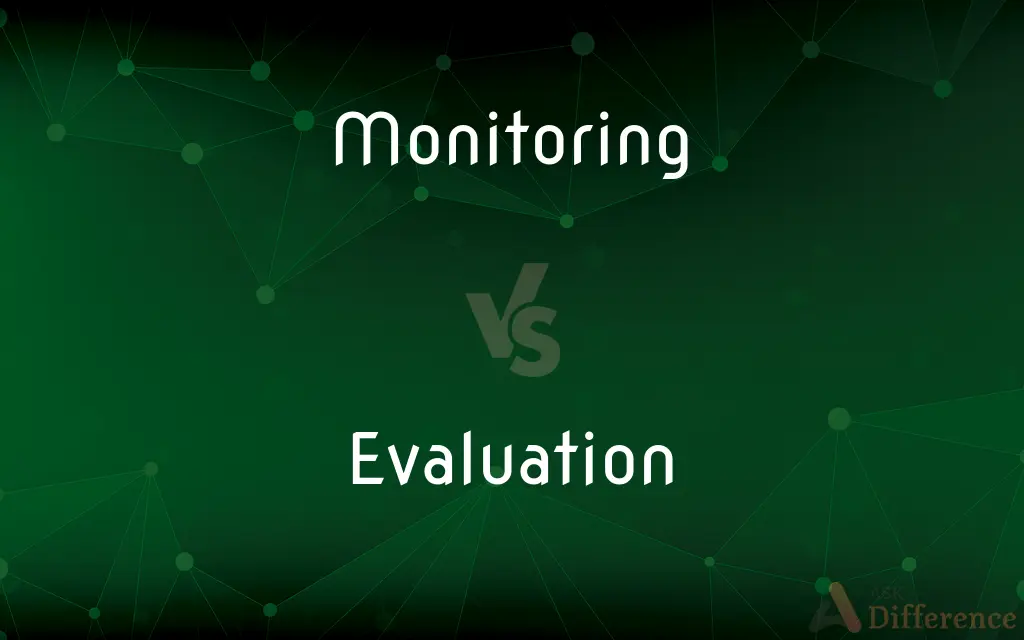Monitoring vs. Evaluation — What's the Difference?
By Tayyaba Rehman — Updated on September 20, 2023
Monitoring is the continuous observation and recording of activities, while evaluation is the systematic assessment of a project's outcomes or performance.

Difference Between Monitoring and Evaluation
Table of Contents
ADVERTISEMENT
Key Differences
Monitoring and evaluation, often clubbed together in projects, hold distinct meanings and purposes. Monitoring, in its essence, is the consistent observation and documentation of activities to provide vital feedback on progress. Through monitoring, stakeholders can gain real-time insights, enabling timely adjustments to maximize efficiency and effectiveness.
On the contrary, evaluation dives deeper, providing a systematic and objective analysis of a project or initiative. It assesses the design, implementation, and results, often at a project's culmination or specific checkpoints. Evaluation, therefore, isn't just about gauging success but identifying lessons, replicable elements, and potential areas of improvement.
While monitoring focuses on the 'how' and 'what'—how activities are being performed and what is being achieved—evaluation delves into the 'why' and 'what next'. By answering why specific outcomes were achieved and suggesting what should be done next, evaluation paves the way for strategic decisions and policy formations.
Both monitoring and evaluation are integral for any project's success. Monitoring ensures that projects remain on track, adhering to standards and timelines. In contrast, evaluation furnishes a broader perspective, verifying if the initiative met its intended goals, and providing a foundation for future endeavors.
Comparison Chart
Purpose
Observing and recording activities
Systematic assessment of outcomes and performance
ADVERTISEMENT
Timing
Continuous during the project
At specific checkpoints or project's end
Focus
Processes and activities
Results, impacts, and lessons learned
Feedback
Real-time insights
Broader perspectives on overall success and improvement
Outcome
Identifies if activities are on track
Determines if goals were met and suggests improvements
Compare with Definitions
Monitoring
Systematic collection and analysis of information in real-time.
Monitoring the patient's vitals provided doctors with critical data.
Evaluation
Examination of results to deduce lessons and recommendations.
The software's evaluation led to significant updates in the next version.
Monitoring
Keeping a watchful eye on progression and developments.
Monitoring the market trends, the company adjusted its marketing strategy.
Evaluation
Review and judgment based on predefined criteria or benchmarks.
The teacher's performance evaluation was based on student feedback and test scores.
Monitoring
Continuous observation and tracking of ongoing activities.
Through regular monitoring, the team detected a potential issue early on.
Evaluation
Systematic assessment of a project's or initiative's outcomes.
The end-of-year evaluation highlighted the program's successes and areas for growth.
Monitoring
Routine scrutiny to maintain optimal performance levels.
Environmental monitoring helps ensure ecosystems remain balanced and healthy.
Evaluation
Objective analysis to determine the effectiveness and impact.
The evaluation of the new policy revealed unexpected societal benefits.
Monitoring
One that admonishes, cautions, or reminds, especially with respect to matters of conduct.
Evaluation
Analytical process to inform future strategies and decisions.
The evaluation of the campaign provided insights for upcoming marketing initiatives.
Monitoring
A pupil who assists a teacher in routine duties.
Evaluation
Evaluation is a systematic determination of a subject's merit, worth and significance, using criteria governed by a set of standards. It can assist an organization, program, design, project or any other intervention or initiative to assess any aim, realisable concept/proposal, or any alternative, to help in decision-making; or to ascertain the degree of achievement or value in regard to the aim and objectives and results of any such action that has been completed.
Monitoring
A usually electronic device used to record, regulate, or control a process or system.
Evaluation
The making of a judgement about the amount, number, or value of something; assessment
An initial evaluation of the programme
The evaluation of each method
Monitoring
A video display or speaker used in a production studio to check audio or video quality
The sound engineer detected a hiss on the monitor.
Evaluation
To ascertain or fix the value or amount of
Evaluate the damage from the flood.
Monitoring
(Computers)A device that accepts video signals from a computer and displays information on a screen; a video display.
Evaluation
To determine the importance, effectiveness, or worth of; assess
Evaluate teacher performance.
Monitoring
(Computers)A program that observes, supervises, or controls the activities of other programs.
Evaluation
(Mathematics) To calculate the numerical value of; express numerically.
Monitoring
An articulated device holding a rotating nozzle with which a jet of water is regulated, used in mining and firefighting.
Evaluation
An assessment, such as an annual personnel performance review used as the basis for a salary increase or bonus, or a summary of a particular situation.
The result of the semestral evaluation will go towards your final score.
Monitoring
A heavily ironclad warship of the 19th century with a low, flat deck and one or more gun turrets.
Evaluation
(mathematics) A completion of a mathematical operation; a valuation.
Monitoring
A modern warship designed for coastal bombardment.
Evaluation
Determination of the value of a variable or expression.
Monitoring
See monitor lizard.
Evaluation
Valuation; appraisement.
Monitoring
To check the quality or content of (an electronic audio or visual signal) by means of a receiver.
Evaluation
Act of ascertaining or fixing the value or worth of
Monitoring
To check by means of an electronic receiver for significant content, such as military, political, or illegal activity
Monitor a suspected criminal's phone conversations.
Evaluation
An appraisal of the value of something;
He set a high valuation on friendship
Monitoring
To keep track of systematically with a view to collecting information
Monitor the bear population of a national park.
Monitored the political views of the people.
Monitoring
To test or sample, especially on a regular or ongoing basis
Monitored the city's drinking water for impurities.
Monitoring
To keep close watch over; supervise
Monitor an examination.
Monitoring
To direct.
Monitoring
To act as a monitor.
Monitoring
Present participle of monitor
Monitoring
The carrying out of surveillance on, or continuous or regular observation of, an environment or people in order to detect signals, movements or changes of state or quality.
Monitoring
The act of observing something (and sometimes keeping a record of it);
The monitoring of enemy communications plays an important role in war times
Monitoring
Ensuring that processes adhere to predefined standards.
Quality monitoring confirmed that the products met the desired specifications.
Common Curiosities
What is the primary purpose of an evaluation?
Evaluation aims to assess outcomes, derive lessons, and suggest improvements.
Is monitoring only about identifying problems?
No, monitoring helps identify both challenges and areas of success.
Is monitoring a one-time activity?
No, monitoring is a continuous, ongoing process throughout a project's duration.
Who typically conducts evaluations?
Evaluations can be conducted by internal teams or external experts, depending on the project's requirements.
Can monitoring and evaluation be used interchangeably?
No, they serve different purposes but complement each other.
Is monitoring only for large projects?
No, monitoring is beneficial for projects of all sizes.
Can evaluation be done without monitoring?
While possible, evaluation benefits from the data and insights gathered during monitoring.
Does monitoring require specialized tools?
While some projects use specialized monitoring tools, others can use basic methods, depending on complexity.
How often should evaluations be conducted?
The frequency depends on the project's needs, either at specific milestones or at the end.
Can evaluation lead to a project's termination?
Yes, if evaluation finds that a project is not meeting its objectives, it can recommend termination.
How are the findings of an evaluation typically used?
Evaluation findings inform decisions, policy formations, and strategies for future projects.
Why is monitoring crucial during project implementation?
Monitoring ensures projects stay on track and meet predefined standards.
Is monitoring limited to quantitative data?
No, monitoring can encompass both quantitative and qualitative data.
How do monitoring and evaluation relate to project outcomes?
Monitoring ensures activities align with goals, while evaluation assesses if the goals were achieved.
What is the relationship between monitoring and feedback?
Monitoring provides real-time feedback to improve project activities and outcomes.
Share Your Discovery

Previous Comparison
Tagliatelle vs. Fettuccine
Next Comparison
Gout vs. BursitisAuthor Spotlight
Written by
Tayyaba RehmanTayyaba Rehman is a distinguished writer, currently serving as a primary contributor to askdifference.com. As a researcher in semantics and etymology, Tayyaba's passion for the complexity of languages and their distinctions has found a perfect home on the platform. Tayyaba delves into the intricacies of language, distinguishing between commonly confused words and phrases, thereby providing clarity for readers worldwide.















































